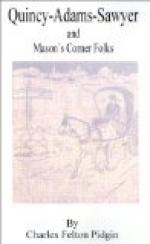About half-past two Deacon Mason drove into the Square, and the Professor went to meet him, and shook hands with him. In a short time his other backers, who had agreed to endorse his notes to the amount of two thousand dollars, arrived upon the scene, and he took occasion to welcome them in a manner that could not escape the attention of the crowd. It was now ten minutes of three, and the auctioneer stepped upon the temporary platform that had been erected for him, and bringing his hammer down upon the head of a barrel that had been placed in front of him, he read, in a loud voice, which reached every portion of the Square, the printed notice that for several weeks had hung upon the fences, sheds, and trees of Mason’s Corner, Eastborough Centre, West Eastborough, and Montrose.
It was now three o’clock, for that hour was rung out by the bell on the Rev. Caleb Howe’s church. The auctioneer prefaced his inquiry for bids by the usual grandiloquence in use by members of that fraternity, closing his oration with that often-heard remark, “How much am I offered?”
The Professor, who was standing by the side of Deacon Mason’s team, called out in a loud voice, “Fifteen hundred!”
“Well, I’ll take that just for a starter,” said the auctioneer, “but of course no sane man not fitted to be the inmate of an idiotic asylum thinks that this fine piece of ground, this long-built and long-established grocery store, filled to overflowing with all the necessities and delicacies of the season, a store which has been in successful operation for nearly forty years, and of which the good will is worth a good deal more than the sum just bid, will be sold for any such preposterous figure! Gentlemen, I am listening.”
Suddenly a voice from the rear of the crowd called out, “T-o-o-t-o to to-oo-two thousand!”
As if by magic, every head was turned, for the majority of those in the crowd recognized the voice at once. There was but one man in Mason’s Corner who stammered, and that man was Hiram Maxwell.
They turned, and all saw seated in the Pettengill team Hiram Maxwell, and beside him sat Mr. Sawyer from Boston.
“Oh, that’s more like it,” said the auctioneer. “Competition is the life of trade, and is particularly pleasing to an auctioneer. The first gentleman who bid now sees that there is another gentleman who has a better knowledge of the value of this fine property than he has evinced up to the present moment. There is still an opportunity for him to see the error of his ways, and put himself on record as being an observing and intelligent person.”
All eyes were turned upon Strout at these words from the auctioneer; his face reddened, and he called out, “Twenty-five hundred!”
“Still better,” cried the auctioneer; “the gentleman, as I supposed, has shown that he is a person of discernment; he did not imagine that I was engaged simply to make a present of this fine establishment to any one who would offer any sum that suited his convenience for it. He knew as well as I did that there would be a sharp contest to secure this fine property. Now, gentlemen, I am offered twenty-five hundred, twenty-five hundred I am offered, twenty-five hundred—”




